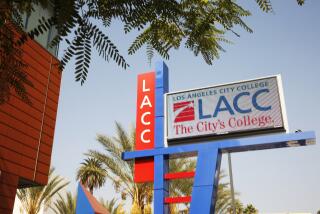Discoveries: ‘Not for Profit: Why Democracies Need the Humanities’ by Martha C. Nussbaum
Not for Profit
Why Democracy Needs the Humanities
Martha C. Nussbaum
Princeton University Press: 158 pp., $22.95
Martha C. Nussbaum, professor of law and ethics at the University of Chicago, is one of the fiercest mythbusters in American academia. When Nussbaum trains her eye on a truism, a falsehood, it melts. In “Not for Profit,” Nussbaum insists that the goal of a liberal arts education is not to make money. Education is not a “tool of the gross national product.” The humanities exist first and foremost to help students become better citizens in a democracy. Schools must stop “teaching to the test” and “neglecting the activities that enliven children’s minds and make them see a connection between their school life and their daily life outside of school.” Democracy and self-governance require that citizens be thoughtful, or both will fall prey to “a greedy obtuseness and a technically trained docility that threaten the very life of democracy itself.” Nothing less than the triumph of “respect and love” over “greed and narcissism” is at stake.
Love in a Time of Homeschooling
A Mother and Daughter’s Uncommon Year
Laura Brodie
Harper: 272 pp., $24.99
More and more people in this country are turning to homeschooling. Laura Brodie, in spite of the criticism of friends, relatives and even her husband, took her oldest daughter, Julia, then 10, out of her Virginia public school. Julia’s “misery quotient” had reached the point at which “mere whining turns into real unhappiness.” Brodie walks us through all the reasons parents choose to homeschool. She writes a detailed, lesson-by-lesson story of the challenges and delights mother and daughter faced in Julia’s “sabbatical” year. She offers a compromise to frustrated parents — a mixture of home and public schooling that many readers will feel is the solution they have been looking for.
Saving Schools
From Horace Mann to Virtual Learning
Paul E. Peterson
Harvard University Press: 336 pp., $25.95
American public schools were inspired and created largely using the ideas of six education reformers: Horace Mann, John Dewey, Martin Luther King Jr., Albert Shanker, William Bennett and James Coleman. In “Saving Schools,” Paul E. Peterson shows how their dreams went wrong; how public schools became a political football with families and communities on one end of the field and states, courts and federal governments on the other. Peterson sees virtual learning as the solution — technology could be used to reinvigorate the personalized approach that public education’s founders and philosophers dreamed of.
No University Is an Island
Saving Academic Freedom
Cary Nelson
NYU Press: 300 pp., $27.95
“No University Is an Island” is the story of the corporatization of the American university. Small salaries, depressed academic job markets, questionable strings on research grants and tight leashes on professors whose choice of material and presentation is closely monitored all conspire to make university education in this country increasingly elite and irrelevant. Academic freedom has ceased to embody “Enlightenment commitments to the pursuit of knowledge and their adaptation to different social and political realities.” Cary Nelson calls on professors and students to work together to embrace shared governance between universities and unions to protect salaries, rights and a renewed commitment to academic freedom.
Salter Reynolds is a writer in Los Angeles.
More to Read
The biggest entertainment stories
Get our big stories about Hollywood, film, television, music, arts, culture and more right in your inbox as soon as they publish.
You may occasionally receive promotional content from the Los Angeles Times.






